The Recommendation Algorithm Based on Improved Conditional Variational Autoencoder and Constrained Probabilistic Matrix Factorization
Abstract
:1. Introduction
- (1)
- Proposing a recommendation algorithm based on an improved CVAE and CPMF, which effectively addresses the issues of poor recommendation performance in traditional user-based collaborative filtering recommendation algorithms due to data rating sparsity and suboptimal feature extraction.
- (2)
- Enhancements are made to the CVAE. In addition to the existing structure, latent layers are incorporated, and random noise is introduced into these layers. Processing input data through these latent layers yields more precise implicit features, thereby enhancing the model’s resilience to interference and its generative capabilities. Furthermore, the CVAE incorporates item categories as auxiliary information for supervising the encoding and decoding of item data. By learning the distribution characteristics of data, it effectively reconstructs missing values in rating data, reducing data sparsity. The reconstructed data is subsequently subjected to CPMF to extract implicit rating features of users and items, optimizing the feature extraction process.
- (3)
- MovieLens-100K and MovieLens-1M datasets are selected for experimental evaluation. Four comparative algorithms are chosen, and the proposed algorithm is compared to them using the same dataset. The comparison results reveal that the proposed algorithm reduces the Root Mean Square Error (RMSE) by 2.26%, 3.30%, 2.57%, and 5.12%, and the Mean Absolute Error (MAE) by 2.63%, 3.66%, 2.53%, and 5.33% respectively. In the MovieLens-1M dataset, RMSE is reduced by 4.39%, 5.49%, 4.22%, and 5.99%, and MAE is reduced by 3.28%, 4.17%, 3.08%, and 5.97%, respectively.
2. Correlation Algorithm
2.1. User-Based Collaborative Filtering Recommendation
- (1)
- Construction of User-Item Matrix
- (2)
- Calculation of User Similarity
- (3)
- Identifying Nearest Neighbors
- (4)
- Predict Ratings and Generate Recommendations
2.2. Autoencoder
2.3. Matrix Factorization
3. Methodology
3.1. Improved Data Reconstruction for CVAE
3.2. CPMF
3.3. Algorithm Flow
4. Experiment and Analysis
4.1. Experimental Data
4.2. Evaluation Index
4.3. Experimental Results and Analysis
5. Conclusions
Author Contributions
Funding
Institutional Review Board Statement
Informed Consent Statement
Data Availability Statement
Conflicts of Interest
References
- Wu, Z.; Tang, Y.; Liu, H. Survey of personalized learning recommendation. J. Front. Comput. Sci. Technol. 2022, 16, 21. [Google Scholar]
- Awan, M.J.; Khan, R.A.; Nobanee, H.; Yasin, A.; Anwar, S.M.; Naseem, U.; Singh, V.P. A recommendation engine for predicting movie ratings using a big data approach. Electronics 2021, 10, 1215. [Google Scholar] [CrossRef]
- Yimu, J.; Ke, L.; Shangdong, L.; Qiang, L.; Haichang, Y.; Kui, L. Collaborative filtering recommendation algorithm based on interactive data classification. J. China Univ. Posts Telecommun. 2020, 27, 1. [Google Scholar]
- Goyani, M.; Chaurasiya, N. A review of movie recommendation system: Limitations, Survey and Challenges. ELCVIA Electron. Lett. Comput. Vis. Image Anal. 2020, 19, 0018–0037. [Google Scholar]
- Qian, Z.; Yang, J.; Li, D.; Ye, Z. Event Recommendation Strategy Combining User Long-Short Term Interest and Event Influence. J. Comput. Res. Dev. 2022, 59, 2803–2815. [Google Scholar]
- Salakhutdinov, R.; Mnih, A.; Hinton, G. Restricted Boltzmann machines for collaborative filtering. In Proceedings of the 24th International Conference on Machine Learning, Corvalis, OR, USA, 20–24 June 2007; ACM: New York, NY, USA, 2007; pp. 791–798. [Google Scholar]
- Wang, X.; Wang, Y. Improving content-based and hybrid music recommendation using deep learning. In Proceedings of the 22nd ACM International Conference on Multimedia, Kaohsiung, Taiwan, 8–10 December 2014; ACM: New York, NY, USA, 2014; pp. 627–636. [Google Scholar]
- Zhang, W.; Zhang, X.; Wang, H.; Chen, D. A deep variational matrix factorization method for recommendation on large scale sparse dataset. Neurocomputing 2019, 334, 206–218. [Google Scholar] [CrossRef]
- Ortega, F.; Lara-Cabrera, R.; González-Prieto, Á.; Bobadilla, J. Providing reliability in recommender systems through Bernoulli matrix factorization. Inf. Sci. 2021, 553, 110–128. [Google Scholar] [CrossRef]
- Chen, J.; Zhu, Y.; Zhou, G.; Cui, L.; Wu, S. Collaborative filtering recommendation based on transfer learning and joint matrix decomposition. J. Sichuan Univ. (Nat. Sci. Ed.) 2020, 57, 1096–1102. [Google Scholar]
- Ma, C.; Li, J.; Pan, P.; Li, G.; Du, J. BDMF: A Biased Deep Matrix Factorization Model for Recommendation. In Proceedings of the 2019 IEEE SmartWorld, Ubiquitous Intelligence & Computing, Advanced & Trusted Computing, Scalable Computing & Communications, Cloud & Big Data Computing, Internet of People and Smart City Innovation (SmartWorld/SCALCOM/UIC/ATC/CBDCom/IOP/SCI), Leicester, UK, 19–23 August 2019; IEEE: Piscataway, NJ, USA, 2019; pp. 1039–1045. [Google Scholar]
- Rong, P.; Zhou, Y.; Cao, B.; Liu, N.N.; Lukose, R.; Scholz, M.; Yang, Q. One-class collaborative filtering. In Proceedings of the 2008 Eighth IEEE International Conference on Data Mining, Pisa, Italy, 15–19 December 2008; IEEE: Piscataway, NJ, USA, 2008; pp. 502–511. [Google Scholar]
- Wu, Y.; Dubois, C.; Zheng, A.X.; Ester, M. Collaborative Denoising Auto-Encoders for Top-N Recommender Systems. In Proceedings of the Ninth ACM International Conference on Web Search and Data Mining, San Francisco, CA, USA, 22–25 February 2016; ACM: New York, NY, USA, 2016; pp. 153–162. [Google Scholar]
- Li, X.; She, J. Collaborative variational autoencoder for recommender systems. In Proceedings of the 23rd ACM SIGKDD Internationalconference on Knowledge Discovery and Data Mining, Halifax, NS, Canada, 13–17 August 2017; ACM: New York, NY, USA, 2017; pp. 305–314. [Google Scholar]
- Chen, Y.; Rijke, M.D. Top-N Recommendation with High-Dimensional Side Information via Locality Preserving Projection. In Proceedings of the 40th International ACM SIGIR Conference on Research and Development in Information Retrieval, Tokyo, Japan, 7–11 August 2017; ACM: New York, NY, USA, 2017; pp. 985–988. [Google Scholar]
- Na, L.; Ming-Xia, L.; Hai-Yang, Q.; Hao-Long, S. A hybrid user-based collaborative filtering algorithm with topic model. Appl. Intell. 2021, 51, 7946–7959. [Google Scholar] [CrossRef]
- Bank, D.; Koenigstein, N.; Giryes, R. Autoencoders. In Machine Learning for Data Science Handbook: Data Mining and Knowledge Discovery Handbook; Springer: Berlin/Heidelberg, Germany, 2023; pp. 353–374. [Google Scholar]
- Pan, Y.; He, F.; Yu, H. Learning social representations with deep autoencoder for recommender system. World Wide Web 2020, 23, 2259–2279. [Google Scholar] [CrossRef]
- Niu, Y.; Su, Y.; Li, S.; Wan, S.; Cao, X. Deep adversarial autoencoder recommendation algorithm based on group influence. Inf. Fusion 2023, 100, 101903. [Google Scholar] [CrossRef]
- Tahmasebi, H.; Ravanmehr, R.; Mohamadrezaei, R. Social movie recommender system based on deep autoencoder network using Twitter data. Neural Comput. Appl. 2021, 33, 1607–1623. [Google Scholar] [CrossRef]
- Wang, H.; Hong, Z.; Hong, M. Research on product recommendation based on matrix factorization models fusing user reviews. Appl. Soft Comput. 2022, 123, 108971. [Google Scholar] [CrossRef]
- Liu, N.; Zhao, J. Recommendation system based on deep sentiment analysis and matrix factorization. IEEE Access 2023, 11, 16994–17001. [Google Scholar] [CrossRef]
- Zheng, X.; Guan, M.; Jia, X.; Guo, L.; Luo, Y. A Matrix Factorization Recommendation System-Based Local Differential Privacy for Protecting Users’ Sensitive Data. IEEE Trans. Comput. Soc. Syst. 2022, 10, 1189–1198. [Google Scholar] [CrossRef]
- Bin, S.; Sun, G. Matrix factorization recommendation algorithm based on multiple social relationships. Math. Probl. Eng. 2021, 2021, 6610645. [Google Scholar] [CrossRef]
- Zhang, H.; Ganchev, I.; Nikolov, N.S.; Ji, Z.; O’Droma, M. FeatureMF: An item feature enriched matrix factorization model for item recommendation. IEEE Access 2021, 9, 65266–65276. [Google Scholar] [CrossRef]
- Salakhutdinov, R.; Mnih, A. Probabilistic matrix factorization. Adv. Neural Inf. Process. Syst. 2008, 1257-1264. [Google Scholar]
- Shi, J.; Wang, D.; Shang, F.; Zhang, H.Y. Research Advances on Stochastic Gradient Descent Algorithms. Acta Autom. Sin. 2021, 47, 2103–2119. [Google Scholar]
- Wang, H.; Wang, N.; Yeung, D.Y. Collaborative deep learning for recommender systems. In Proceedings of the 21th ACM SIGKDD International Conference on Knowledge Discovery and Data Mining, Sydney, Australia, 10–13 August 2015; ACM: New York, NY, USA, 2015; pp. 1235–1244. [Google Scholar]
- Liu, J.; Wang, D.; Ding, Y. PHD: A Probabilistic Model of Hybrid Deep Collaborative Filtering for Recommender Systems. In Proceedings of the Asian Conference on Machine Learning, Seoul, Republic of Korea, 15–17 November 2017; PMLR: New York, NY, USA, 2017; pp. 224–239. [Google Scholar]
- Wang, C.; Blei, D.M. Collaborative Topic Modeling for Recommending Scientific Articles. In Proceedings of the 17th ACM SIGKDD International Conference on Knowledge Discovery and Data Mining, San Diego, CA, USA, 21–24 August 2011; ACM: New York, NY, USA, 2011; pp. 448–456. [Google Scholar]
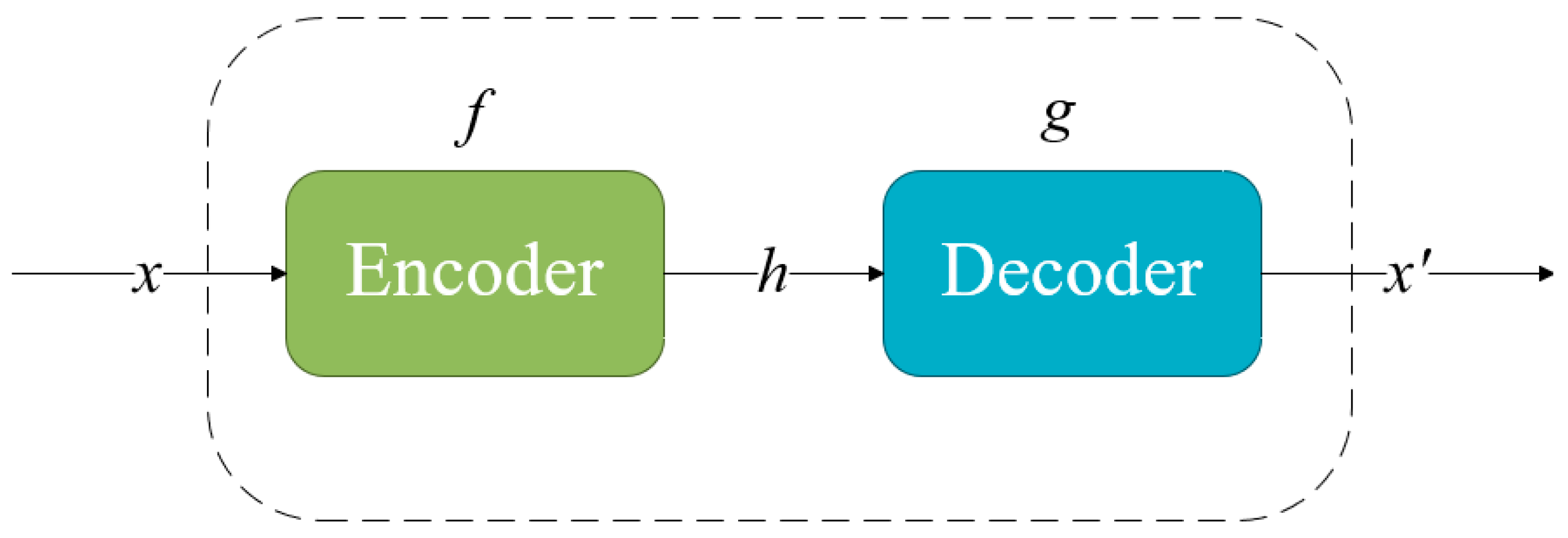

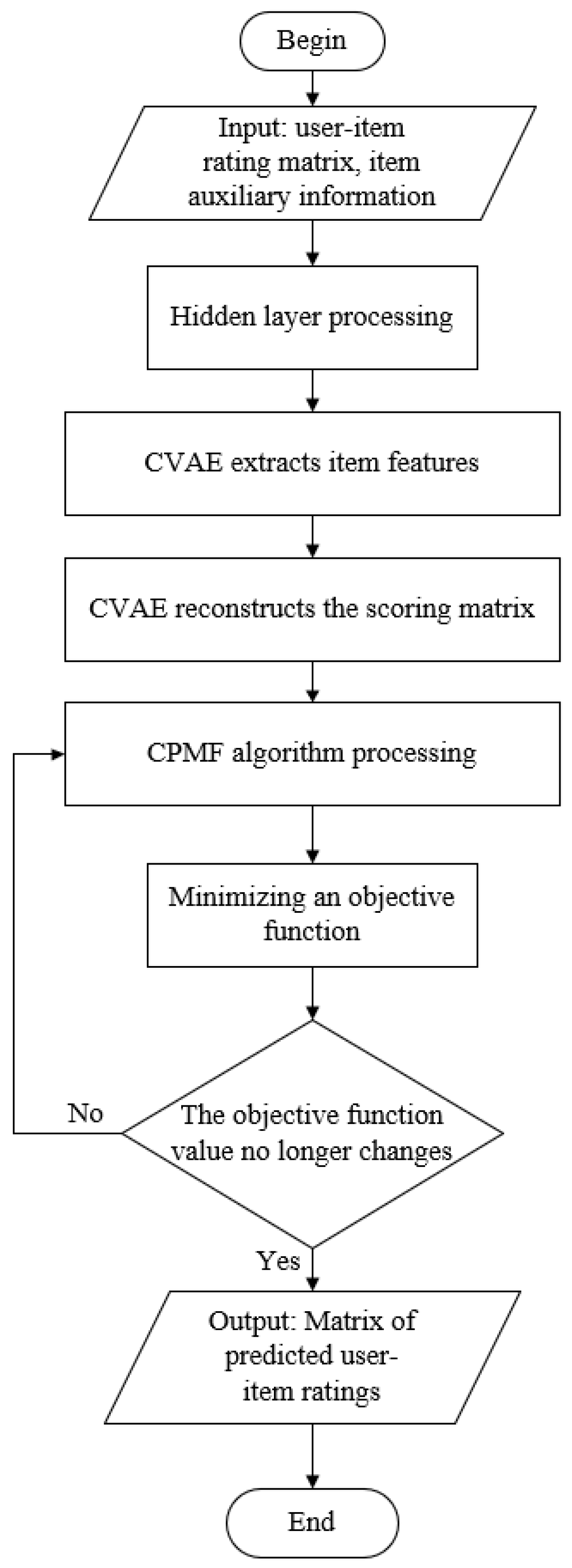
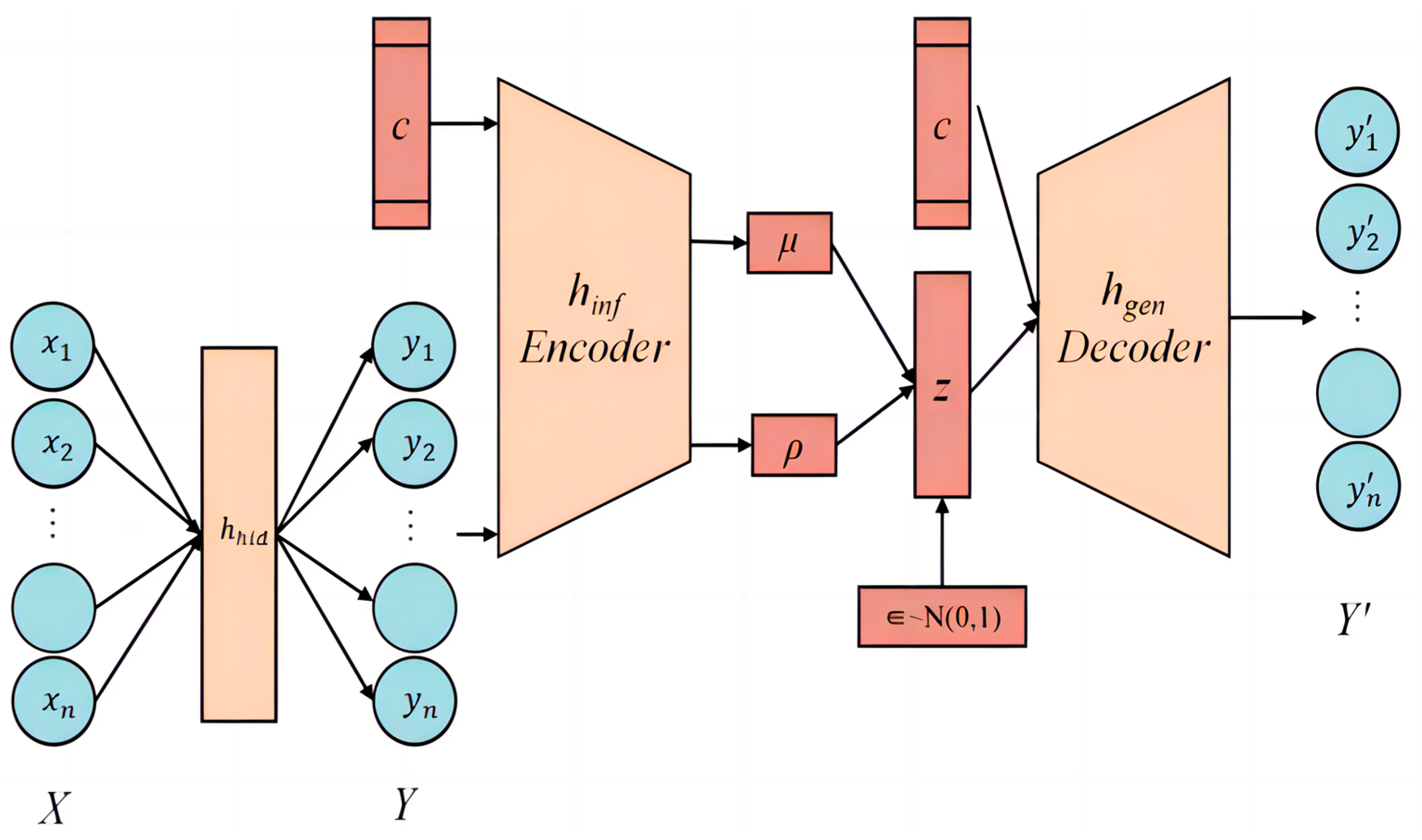
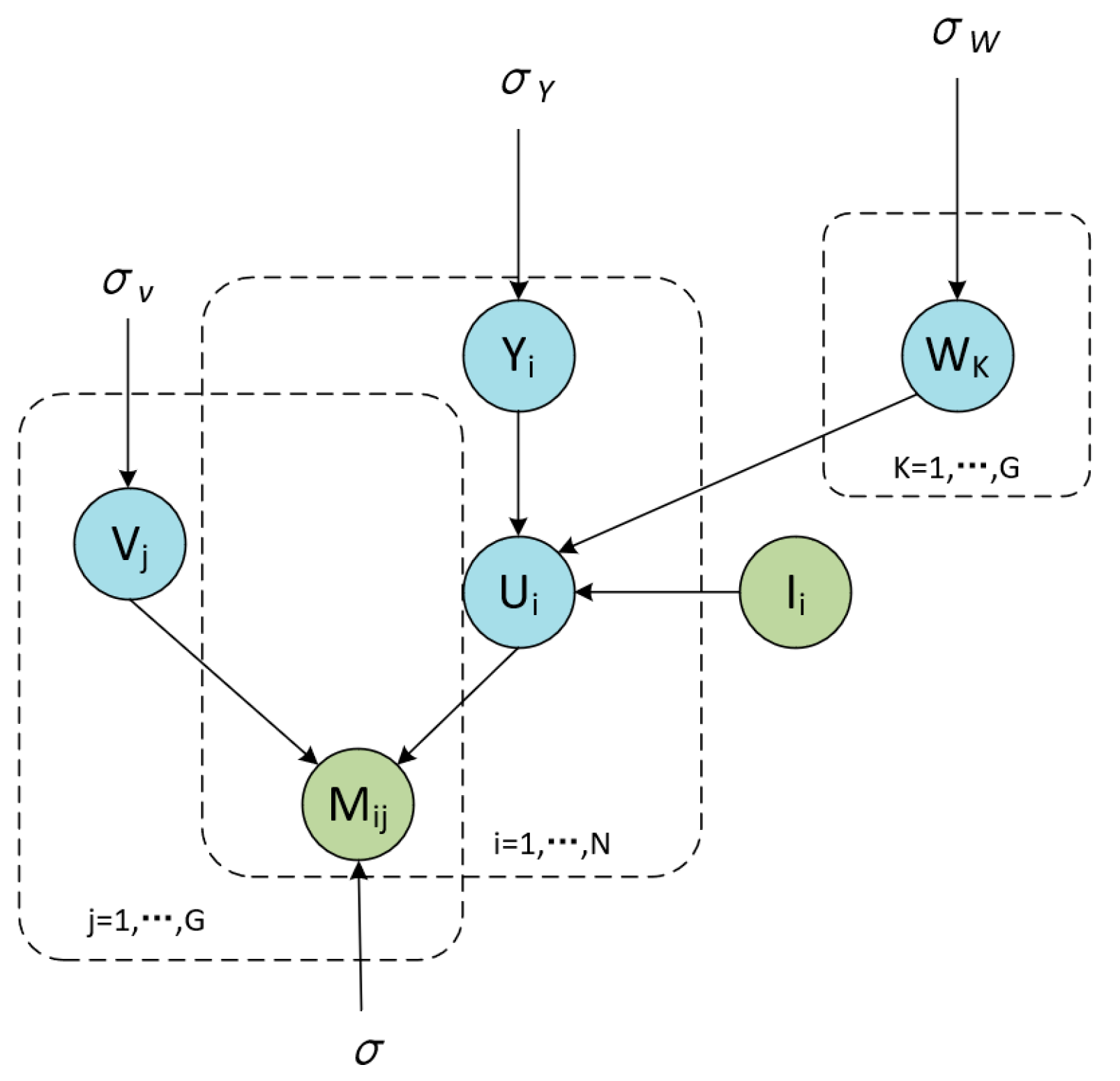


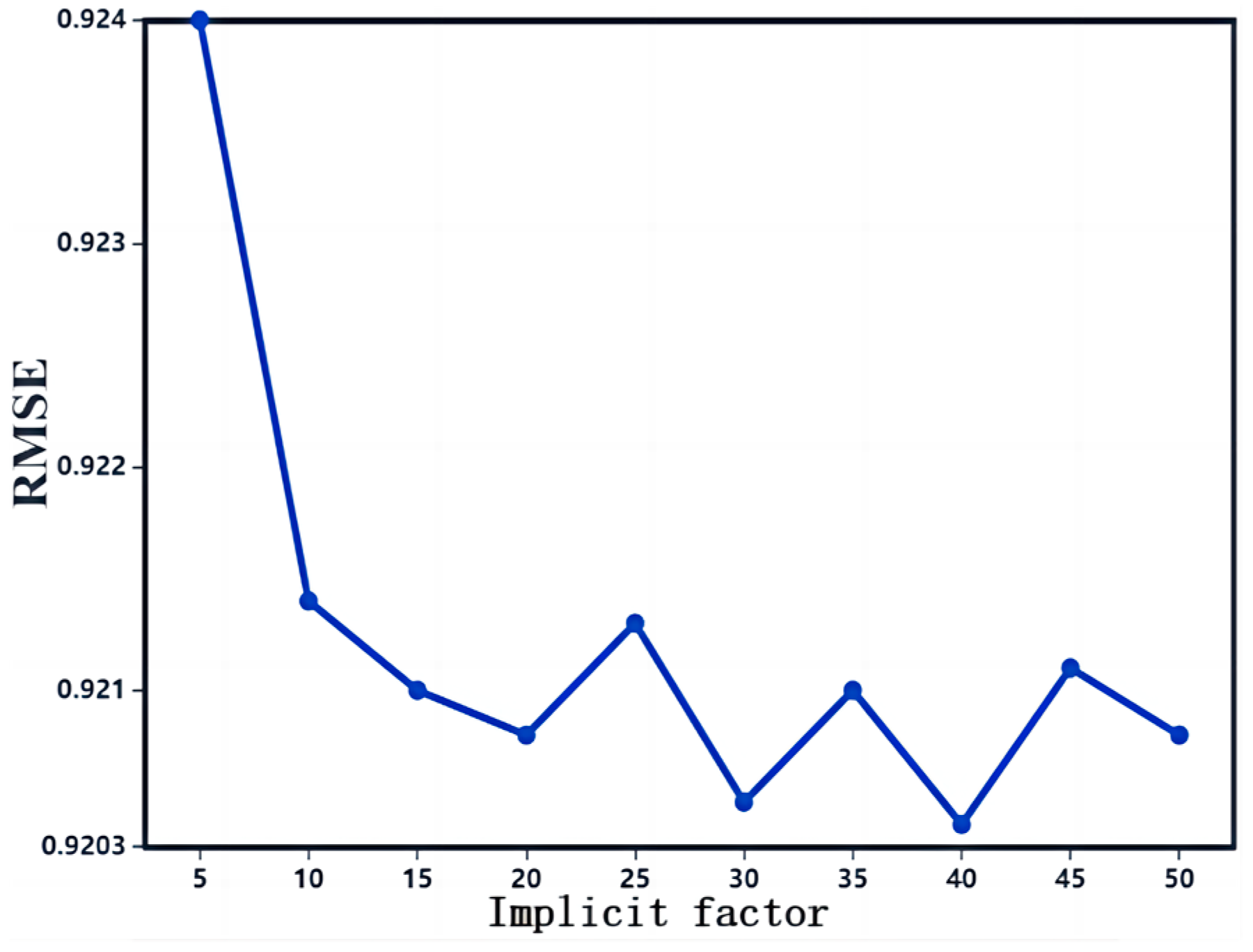

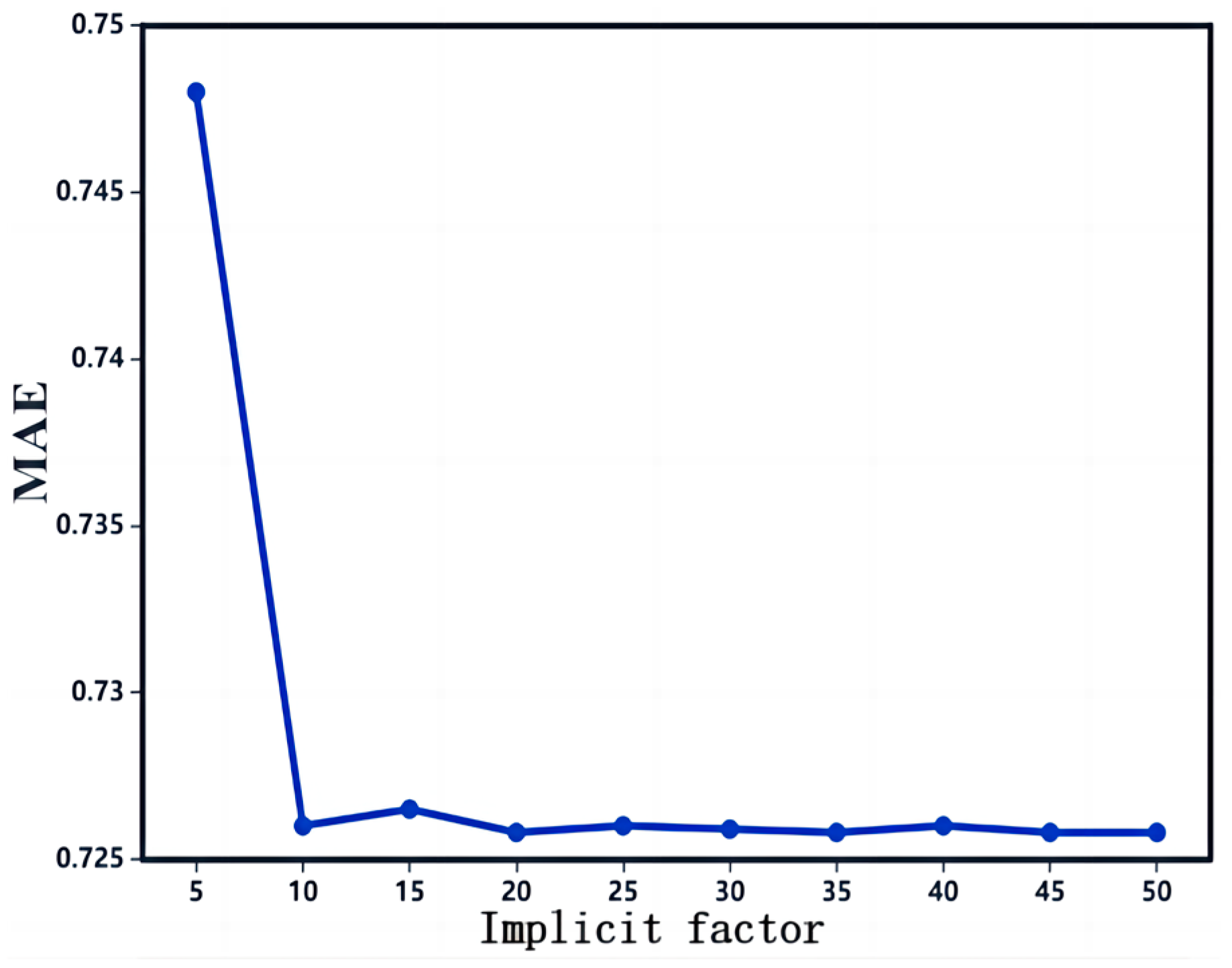
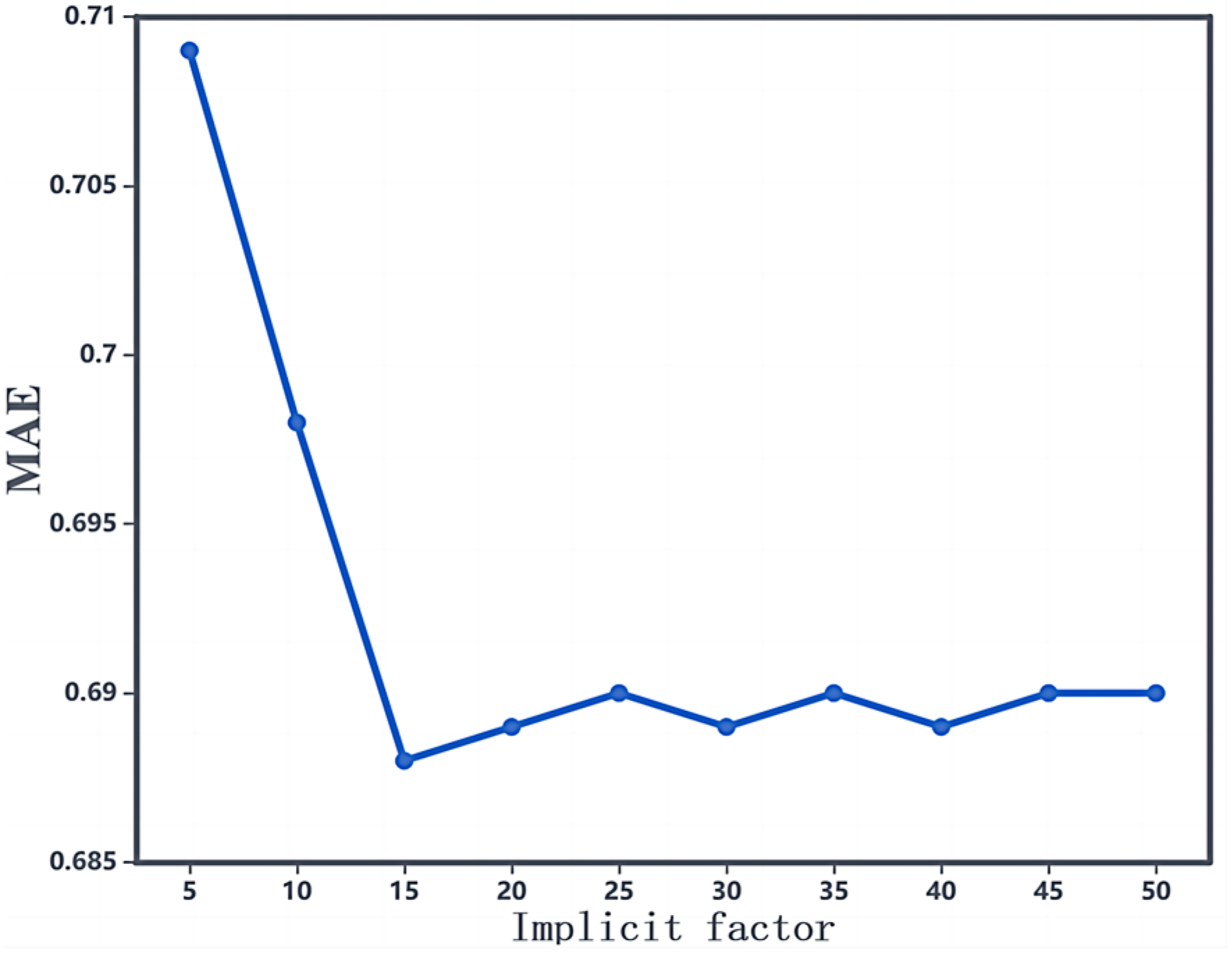

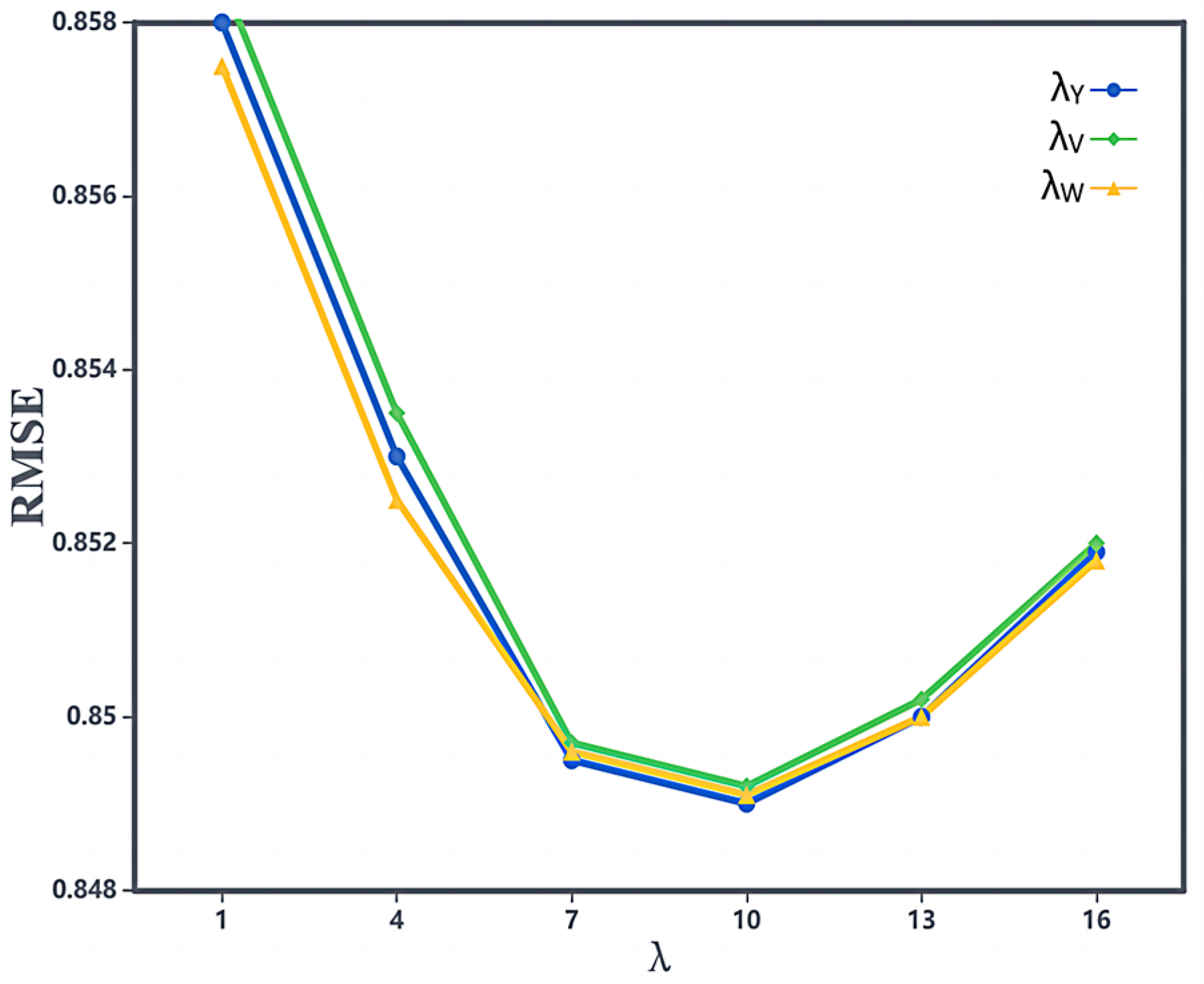

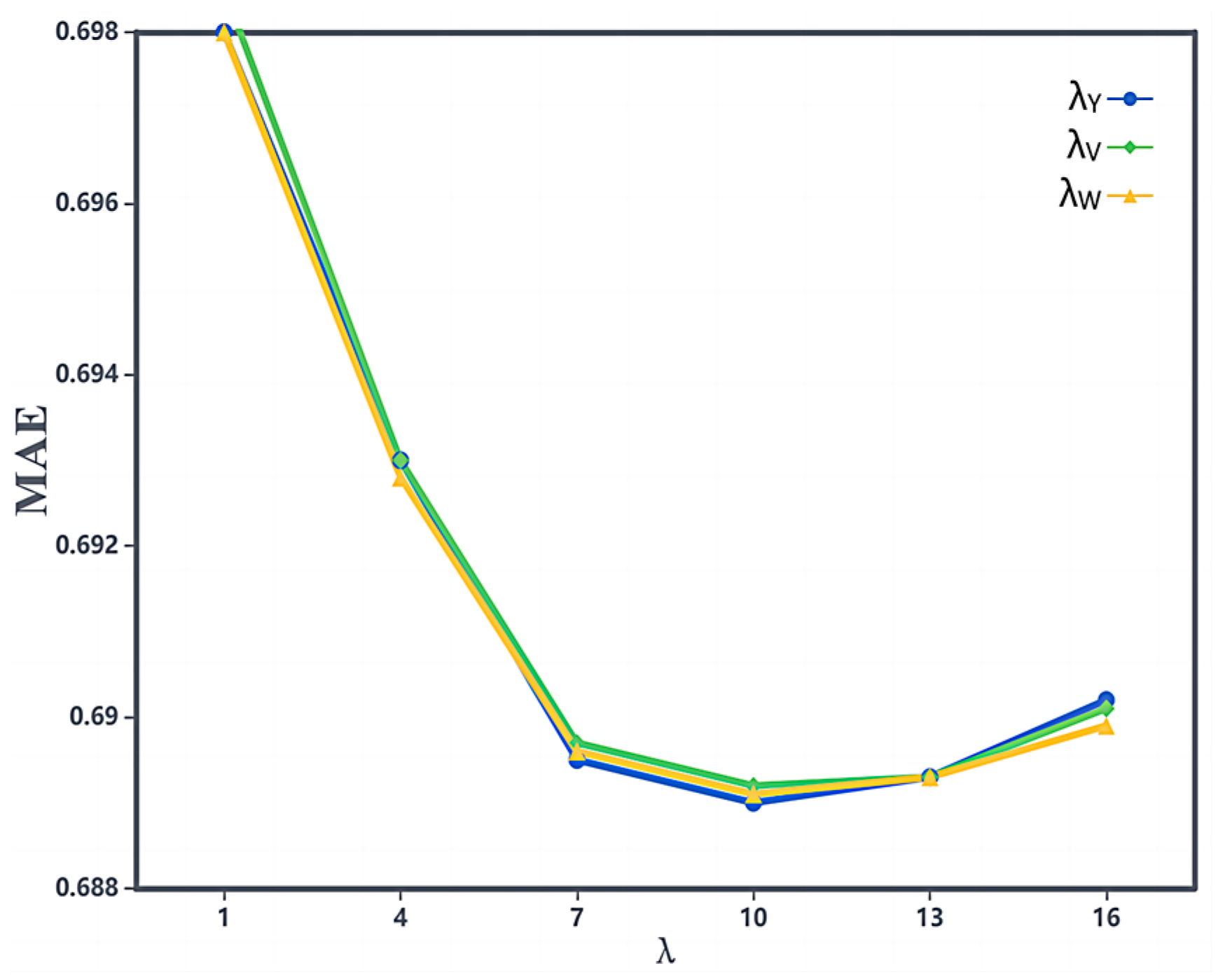




| Dataset Information | MovieLens-100K | MovieLens-1M |
|---|---|---|
| Number of users | 943 | 6040 |
| Number of movies | 1682 | 3544 |
| Movie Categories | unknown|Action|Adventure|Animation|Children’s|Comedy|Crime|Documentary… | |
| Range of ratings | 1~5 | |
| Rating items | 100,000 | 993,482 |
| Comparison Method | RMSE | MAE |
|---|---|---|
| CDL | 0.9234 | 0.7485 |
| CTR | 0.9338 | 0.7588 |
| PHD | 0.9265 | 0.7475 |
| PMF | 0.9520 | 0.7755 |
| This Paper | 0.9008 | 0.7222 |
| Comparison Method | RMSE | MAE |
|---|---|---|
| CDL | 0.8922 | 0.7183 |
| CTR | 0.9032 | 0.7272 |
| PHD | 0.8905 | 0.7163 |
| PMF | 0.9082 | 0.7452 |
| This Paper | 0.8483 | 0.6855 |
Disclaimer/Publisher’s Note: The statements, opinions and data contained in all publications are solely those of the individual author(s) and contributor(s) and not of MDPI and/or the editor(s). MDPI and/or the editor(s) disclaim responsibility for any injury to people or property resulting from any ideas, methods, instructions or products referred to in the content. |
© 2023 by the authors. Licensee MDPI, Basel, Switzerland. This article is an open access article distributed under the terms and conditions of the Creative Commons Attribution (CC BY) license (https://creativecommons.org/licenses/by/4.0/).
Share and Cite
Zhang, Y.; Xu, H.; Yu, X. The Recommendation Algorithm Based on Improved Conditional Variational Autoencoder and Constrained Probabilistic Matrix Factorization. Appl. Sci. 2023, 13, 12027. https://doi.org/10.3390/app132112027
Zhang Y, Xu H, Yu X. The Recommendation Algorithm Based on Improved Conditional Variational Autoencoder and Constrained Probabilistic Matrix Factorization. Applied Sciences. 2023; 13(21):12027. https://doi.org/10.3390/app132112027
Chicago/Turabian StyleZhang, Yunfei, Hongzhen Xu, and Xiaojun Yu. 2023. "The Recommendation Algorithm Based on Improved Conditional Variational Autoencoder and Constrained Probabilistic Matrix Factorization" Applied Sciences 13, no. 21: 12027. https://doi.org/10.3390/app132112027
APA StyleZhang, Y., Xu, H., & Yu, X. (2023). The Recommendation Algorithm Based on Improved Conditional Variational Autoencoder and Constrained Probabilistic Matrix Factorization. Applied Sciences, 13(21), 12027. https://doi.org/10.3390/app132112027





